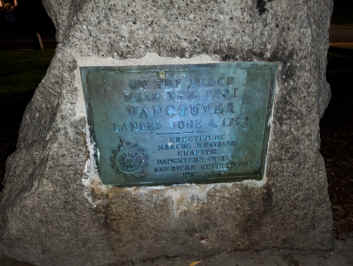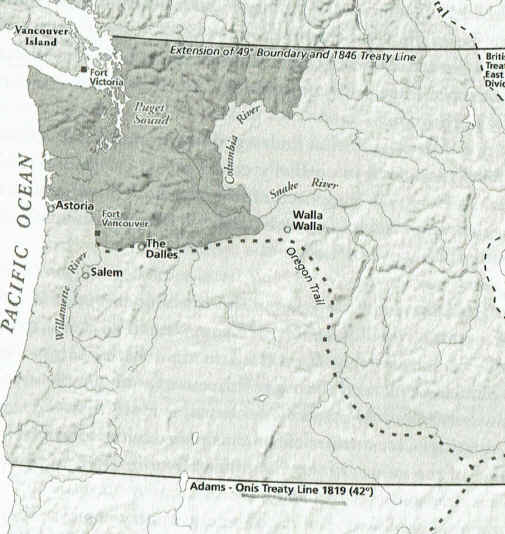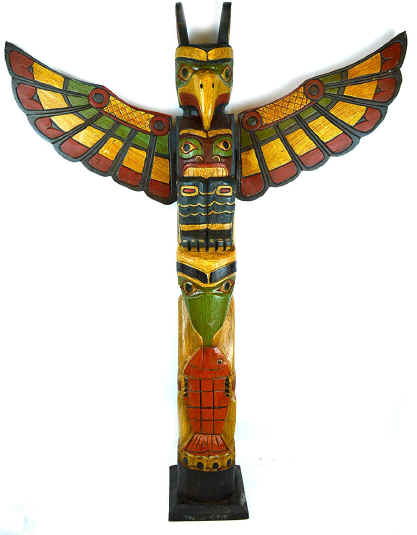Cascadia
And
I think of my happy condition,
Surrounded by Acres of Clams.
Lay
of the Old Settler
(Early
Northwest folk song
by The Brothers Four)
Dominic
Vautier
9/17/18
 When
I was a little kid living in Everett, Washington I used to go down to the long narrow park on Grand Avenue
a few blocks from where I lived. A
big tree hung out over the steep bluff dangling a sturdy rope, and it was great
fun to grab the rope and swing out into the abyss way over the brambles and
blackberries far below. It was even rumored that a kid had been killed on those bluffs. Today the place is called
Grand Avenue Park.
When
I was a little kid living in Everett, Washington I used to go down to the long narrow park on Grand Avenue
a few blocks from where I lived. A
big tree hung out over the steep bluff dangling a sturdy rope, and it was great
fun to grab the rope and swing out into the abyss way over the brambles and
blackberries far below. It was even rumored that a kid had been killed on those bluffs. Today the place is called
Grand Avenue Park.
An obscure and little noticed park stone was there containing a impressive bronze plaque
which read “ON THE BEACH NEAR THIS SPOT VANCOUVER LANDED, JUNE 4, 1792”.
The plaque is still there and certainly my memory of it is.
 Casual
research leads me to wonder why and how Seattle
and Puget Sound ever managed to wind up in the United States, a question that may surprise some but still a very worthwhile question to ask
especially since the British were not much inclined to give up hard fought for
and painfully acquired terratories.
Consider that all this area was explored by the British, settled by the British,
fortified by the British and occupied by the British before we came along. So what happened?
How did we get it?
Casual
research leads me to wonder why and how Seattle
and Puget Sound ever managed to wind up in the United States, a question that may surprise some but still a very worthwhile question to ask
especially since the British were not much inclined to give up hard fought for
and painfully acquired terratories.
Consider that all this area was explored by the British, settled by the British,
fortified by the British and occupied by the British before we came along. So what happened?
How did we get it?
Some
may have a vague recollection that Britain
and the U.S.
extended the 49th parallel because it made good sense and looked
like a clean way to settle a long and festering dispute (which actually makes no
sense--artificial lines never make any particular sense). Also since we had a lot of settlers here and the “54 40 or fight”
rage was at a high peak by 1846, it may have somehow convinced England
to back down and give up all their land and settlements north of the
Columbia River. Not very likely I think. Too wasn’t it somehow our destiny to conquer and own this area of the
Northwest under the so-called oft-preached concept of “Manifest Destiny”?
This may be one way to explain why the British decided to freely gave up
their land, or at least that’s what the history books try to tell us? No, not
quite. I found that there is a more complex story here.
Even
as late as 1840 few Americans actually lived north of the Columbia River thanks
to the continuing efforts of the Hudson’s Bay Company (HBC) to settle the
region, work closely with the Indian populations and occupy all the good fir
trading areas (Stark, 299). By the
early part of that century HBC had successfully driven out all competing
interests including Aster’s Northwest Company along with the North American
Fir Company. This was largely due to
continuing government support, a keen management spirit, a strong maritime
transportation structure, and an active and well connected fir trading market
throughout the world.
There
is no question that Great Britain
had a strong claim to Cascadia, (the Disputed Area as it was known), that is,
the land north of the Columbia River now western
Washington
State. Early explorations by Cooke,
Vancouver, Mackenzie, and settlers such as John McLaughlin (Bown, 60) had
solidly established these territories as British. After the treaties of 1817 Great Britain ALLOWED joint occupation of the
Oregon Territory for 10 years, (to be extended indefinitely in 1827), knowing
full well that the land north of the Columbia was theirs by right of discovery
and occupation. The British
immediately seized the opportunity by encouraging HBC to continue expanding an
already strong presence by constructing many Columbia River based forts (fir
trading centers) even in Puget sound itself; Ft. Colville (1825), Ft. Vancouver
(1825), Ft. Nisqually near Tacoma (1843) as well as Astoria which itself was
briefly held by Britain during the 1812 war. These forts were all north of the Columbia River
occupying Cascadia. The forts were, by the way, not really forts but factories
in the sense that fur was purchased, brought in, collected, sorted, tanned and
stored for shipment. The designation
Ft. may have been an abbreviation for factory and the factory boss or director
was called the factor. Meanwhile the
US
government did nothing to strengthen or support any kind of effort to colonize
or occupy the region.
Dr.
John McLaughlin, who was the factor of Ft.
Vancouver
from 1824 to 1845, encouraged newly arrived settlers to move south of the
Columbia
and establish settlements in and around Oregon City
on the Willamette River where he claimed the soil was much richer. It was. He had long convinced
himself that the Cascadia region would absolutely become British territory once
the American Government came to its senses, so he retained his Canadian
citizenship. By 1840 that area was under total control and administration of the
British.
 John McLaughlin was a good man.
He
helped many of the early pioneers with loans, supplies and advice. He worked tirelessly for HBC but was ignominiously dismissed 1845 because
of non-performance. Actually it was
because the fir trade had collapsed. One
year later the treaty was signed giving Cascadia to America. He retired to his home in
Oregon City
and was resented by the locals who were quick to accuse him of injustices and
misappropriations. After his death
his memory was exonerated and he became sort of a folk hero.
John McLaughlin was a good man.
He
helped many of the early pioneers with loans, supplies and advice. He worked tirelessly for HBC but was ignominiously dismissed 1845 because
of non-performance. Actually it was
because the fir trade had collapsed. One
year later the treaty was signed giving Cascadia to America. He retired to his home in
Oregon City
and was resented by the locals who were quick to accuse him of injustices and
misappropriations. After his death
his memory was exonerated and he became sort of a folk hero.
But
1840 became a year of turmoil for the young United States. Our government was hopelessly and
completely torn over Texas
and slavery issues, we were still recovering from the disastrous 1812 war with Britain, and the stock market had crashed in 1837 creating a large population of
restless homeless farmers. Uncertainty
and revolt was upon the land.
I have indentified three major events which probably shaped the future of
northwest and western
Washington. These events very likely persuaded
the British that a prolonged struggle to retain its Cascadia lands was not only
futile but hopeless. It was no small
task to force Britain
to give up its solid hold on Cascadia,
especially in light of it’s long colonial tradition. The Americans were not getting away with it again, or were they?
The Nootka Affair
Sources:
Buck, Rinker, The
Oregon Trail, 2015
Toll,
Ian, Six Frigates, 2006.
Horwitz, Tony, Blue
Latitudes, 2003.
Borneman, Walter R., Polk, 2008.
Borneman, Walter R., Rival Rails, 2002.
Bown, Stephen R., Madness Betrayal and the
Lash, 2008.
McCrum, Robert, Cran, William; MacNeil, Robert., The Story of English,
1986
Stark, Peter, Astoria, 2015
* Borneman cited from Polk unless otherwise indicated
 When
I was a little kid living in Everett, Washington I used to go down to the long narrow park on Grand Avenue
a few blocks from where I lived. A
big tree hung out over the steep bluff dangling a sturdy rope, and it was great
fun to grab the rope and swing out into the abyss way over the brambles and
blackberries far below. It was even rumored that a kid had been killed on those bluffs. Today the place is called
Grand Avenue Park.
When
I was a little kid living in Everett, Washington I used to go down to the long narrow park on Grand Avenue
a few blocks from where I lived. A
big tree hung out over the steep bluff dangling a sturdy rope, and it was great
fun to grab the rope and swing out into the abyss way over the brambles and
blackberries far below. It was even rumored that a kid had been killed on those bluffs. Today the place is called
Grand Avenue Park. Casual
research leads me to wonder why and how Seattle
and Puget Sound ever managed to wind up in the United States, a question that may surprise some but still a very worthwhile question to ask
especially since the British were not much inclined to give up hard fought for
and painfully acquired terratories.
Consider that all this area was explored by the British, settled by the British,
fortified by the British and occupied by the British before we came along. So what happened?
How did we get it?
Casual
research leads me to wonder why and how Seattle
and Puget Sound ever managed to wind up in the United States, a question that may surprise some but still a very worthwhile question to ask
especially since the British were not much inclined to give up hard fought for
and painfully acquired terratories.
Consider that all this area was explored by the British, settled by the British,
fortified by the British and occupied by the British before we came along. So what happened?
How did we get it? John McLaughlin was a good man.
He
helped many of the early pioneers with loans, supplies and advice. He worked tirelessly for HBC but was ignominiously dismissed 1845 because
of non-performance. Actually it was
because the fir trade had collapsed. One
year later the treaty was signed giving Cascadia to America. He retired to his home in
Oregon City
and was resented by the locals who were quick to accuse him of injustices and
misappropriations. After his death
his memory was exonerated and he became sort of a folk hero.
John McLaughlin was a good man.
He
helped many of the early pioneers with loans, supplies and advice. He worked tirelessly for HBC but was ignominiously dismissed 1845 because
of non-performance. Actually it was
because the fir trade had collapsed. One
year later the treaty was signed giving Cascadia to America. He retired to his home in
Oregon City
and was resented by the locals who were quick to accuse him of injustices and
misappropriations. After his death
his memory was exonerated and he became sort of a folk hero.